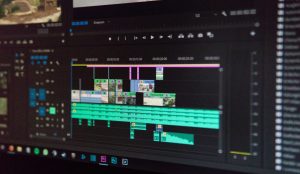Tripod Brixton,
Lambeth Town Hall,
1 Brixton Hill, London,
SW2 1RW
Hours: Monday to Friday, 8am – 7pm
Phone: 020 7580 7333
 “I need to find a freelance editor, but I’m not sure what I can ask them to do”.
“I need to find a freelance editor, but I’m not sure what I can ask them to do”.
The role of a video editor may seem self-explanatory, but depending on the level of input and technical ability you require, they can do a lot more than just basic video editing for you. Welcome to Yellow Cat’s second breakdown of a tricky-to-define job role, helping you to book a freelance editor that’s a perfect fit for your project.
What is a freelance video editor?
The basic role of a video editor is to assemble raw recorded material into a compelling finished product. They combine footage with audio, graphics and effects to portray a clear narrative or message, and are responsible for making key creative decisions during post-production. For short form editing, they can work on anything from an advert to a piece of branded content for social media.
What’s in an editor’s job description?
What does an editor do to create a finished piece of content? Based on the requirements of your project, you can ask an editor to handle any of the following:
What is an editor’s skill set?
Sometimes a freelance editor will be heavily involved with the creative process, while other jobs will simply require that they follow a set treatment to deliver the brief. Whatever the case, video editors must have experience with editing softwares such as Apple’s Final Cut Pro, Avid or Adobe Premiere Pro. They may also be qualified in additional softwares, such as AFX for adding graphics or DaVinci Resolve for colour grading. Overall, an editor’s talent lies within storytelling ability and meticulous attention to detail.
Client FAQs
Many editors are happy to work on their own kit, and some even prefer it if they have a good set up and fast machine. The majority will charge extra for this as a ‘kit hire fee’, to cover their costs for software licenses and general upkeep of their machine. Some editors won’t work on their own kit, or if it isn’t portable they may need to work remotely.
Editors work ten hours per day as a rule, but some will choose to quote their rate based on an eight hour day. Be sure to check when someone is quoting their rate to you, and specify the times you expect them to start and finish each day.
This varies based on skill set and experience level. Here at Yellow Cat an industry standard editor will usually charge £250-350 per day for editing. If you require a freelancer who also has experience with graphics or colour grading, their rate may be slightly higher.
Yes, the industry standard is time and a half after the agreed hours, so make sure you keep track and check what their overtime rate is in advance. Always check the above and specify what you need before booking someone.
This depends on who you hire and what you ask of them. In your initial brief or when talking to your recruiter, be clear on what kind of editor you need and if you want someone who can have a creative input.
Yes, some editors are great at working alongside clients and taking on their direction. Again, make sure to mention in advance if the edit will have a client attending, as this may affect the type of editor you choose to hire.
Of course, but as these tasks are additional to the basic editing process, you must mention in the initial brief that they are required. Editors who can do this may charge extra, so bear this in mind when getting a quote.
It depends on what needs changing, and how long it takes. If the changes will take time out of an editors day, or require them to travel into your office, they may wish to charge for their time. After an edit it’s always a good idea to retain all assets needed for future changes, so if the original editor is unavailable you can have someone else work on the project.
Why should you hire a freelance editor?
You may not need a permanent editor on your team, but when a piece of video content is required they quickly become indispensable. A freelance editor will be flexible to your brief, and their technical abilities will directly determine whether a video accomplishes its goals. While they might work alongside a production team or use a script, the overall tone of a piece is in the editor’s hands.
Tripod Brixton,
Lambeth Town Hall,
1 Brixton Hill, London,
SW2 1RW
Hours: Mon to Fri, 8am – 7pm
Phone: 020 7580 7333
Tripod Brixton,
Lambeth Town Hall,
1 Brixton Hill, London,
SW2 1RW
Hours: Monday to Friday, 8am – 7pm
Phone: 020 7580 7333